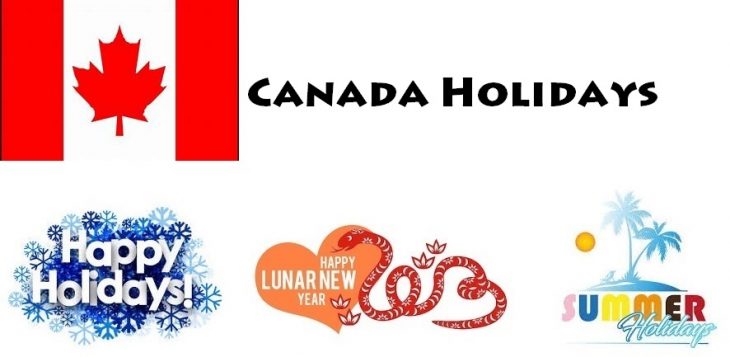Canada Holidays
Canada Public Holidays
Searching for the national holidays in Canada? All public holidays in Canada are treated like Sundays. This means that most of the Canada employees have a day off and all schools are closed on these office holidays. If you are planning a trip to Canada and want to know what the national and regional holidays are, check the details in the tables below.
List of Official Holidays in Canada for Year 2020
| # | Date | Holiday | Day |
| 1 | January 01, 2020 | New Year’s Day | Wednesday |
| 2 | February 17, 2020 | Nova Scotia Heritage Day | Monday |
| 3 | February 17, 2020 | Louis Riel Day | Monday |
| 4 | February 17, 2020 | Family Day | Monday |
| 5 | February 17, 2020 | Islander Day | Monday |
| 6 | March 16, 2020 | St. Patrick’s Day | Monday |
| 7 | April 10, 2020 | Good Friday | Friday |
| 8 | April 13, 2020 | Easter Monday | Monday |
| 9 | April 20, 2020 | St. George’s Day | Monday |
| 10 | May 10, 2020 | Mother’s Day | Sunday |
| 11 | May 18, 2020 | Victoria Day | Monday |
| 12 | May 18, 2020 | National Patriots’ Day | Monday |
| 13 | June 21, 2020 | Father’s Day | Sunday |
| 14 | June 21, 2020 | National Aboriginal Day | Sunday |
| 15 | June 22, 2020 | Discovery Day | Monday |
| 16 | June 24, 2020 | The National Holiday of Quebec | Wednesday |
| 17 | July 01, 2020 | Canada Day | Wednesday |
| 18 | July 09, 2020 | Nunavut Day | Thursday |
| 19 | July 13, 2020 | Orangeman’s Day | Monday |
| 20 | August 03, 2020 | Civic Day | Monday |
| 21 | August 03, 2020 | Civic Holiday | Monday |
| 22 | August 03, 2020 | Heritage Day | Monday |
| 23 | August 17, 2020 | Discovery Day | Monday |
| 24 | September 07, 2020 | Labour Day | Monday |
| 25 | October 12, 2020 | Thanksgiving | Monday |
| 26 | October 12, 2020 | Thanksgiving | Monday |
| 27 | November 11, 2020 | Remembrance Day | Wednesday |
| 28 | December 25, 2020 | Christmas Day | Friday |
| 29 | December 26, 2020 | Boxing Day | Saturday |
| 30 | December 28, 2020 | Boxing Day | Monday |
List of Official Holidays in Canada for Year 2021
| # | Date | Holiday | Day |
| 1 | January 01, 2021 | New Year’s Day | Friday |
| 2 | February 15, 2021 | Islander Day | Monday |
| 3 | February 15, 2021 | Family Day | Monday |
| 4 | February 15, 2021 | Louis Riel Day | Monday |
| 5 | February 15, 2021 | Nova Scotia Heritage Day | Monday |
| 6 | March 15, 2021 | St. Patrick’s Day | Monday |
| 7 | April 02, 2021 | Good Friday | Friday |
| 8 | April 05, 2021 | Easter Monday | Monday |
| 9 | April 26, 2021 | St. George’s Day | Monday |
| 10 | May 09, 2021 | Mother’s Day | Sunday |
| 11 | May 24, 2021 | Victoria Day | Monday |
| 12 | May 24, 2021 | National Patriots’ Day | Monday |
| 13 | June 20, 2021 | Father’s Day | Sunday |
| 14 | June 21, 2021 | National Aboriginal Day | Monday |
| 15 | June 21, 2021 | Discovery Day | Monday |
| 16 | June 24, 2021 | The National Holiday of Quebec | Thursday |
| 17 | July 01, 2021 | Canada Day | Thursday |
| 18 | July 09, 2021 | Nunavut Day | Friday |
| 19 | July 12, 2021 | Orangeman’s Day | Monday |
| 20 | August 02, 2021 | Heritage Day | Monday |
| 21 | August 02, 2021 | Civic Holiday | Monday |
| 22 | August 02, 2021 | British Columbia Day | Monday |
| 23 | August 02, 2021 | Civic Day | Monday |
| 24 | August 16, 2021 | Discovery Day | Monday |
| 25 | September 06, 2021 | Labour Day | Monday |
| 26 | October 11, 2021 | Thanksgiving | Monday |
| 27 | October 11, 2021 | Thanksgiving | Monday |
| 28 | November 11, 2021 | Remembrance Day | Thursday |
| 29 | December 25, 2021 | Christmas Day | Saturday |
| 30 | December 26, 2021 | Boxing Day | Sunday |
| 31 | December 26, 2021 | Boxing Day | Sunday |
| 32 | December 31, 2021 | New Year’s Eve | Friday |















































